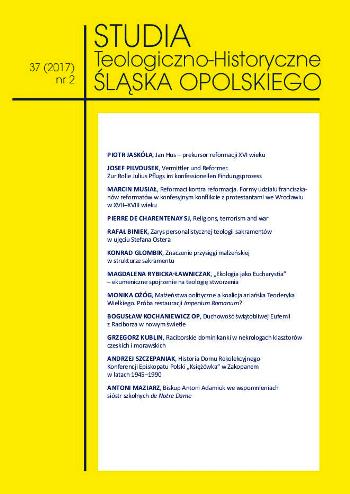Znaczenie przysięgi małżeńskiej w strukturze sakramentu
The significance of the nuptial promise in the structure of the sacrament.
Author(s): Konrad GlombikSubject(s): Christian Theology and Religion, Canon Law / Church Law, Sociology of Religion
Published by: Uniwersytet Opolski
Keywords: nuptial promise; sacrament of marriage; reciprocal devotion; theology of marriage;
Summary/Abstract: The question of the nuptial promise is a topic in the research of canonists, liturgists and theologians. In the theology the reflection on the nuptial promise is often reduced to the explanation of its contents and the question about the minister of this sacrament. In the documents of the Catholic Church on marriage and in the theological studies the statement about the nuptial promise as the constitutive element of the sacrament is unquestionable. However, the notion of nuptial promise requires a deeper analysis. More specifically, the attention needs to be given to the significance of the nuptial promise in the structure of the sacrament. This is one of the important questions in today’s theology of marriage. Both the nature of the nuptial promise and its contents and the context of its expression have the significance for the sacrament of marriage and are connected to its essence. The present paper on the basis of the contemporary theological reflection and the documents of the Catholic Church on marriage talks over the fundamental elements of the nuptial promise and their significance and place in the structure of the sacrament. The first one is the initiation of the sacrament. The second element is the reciprocal devotion that takes place through the marital promise and realizes itself during the whole of marital life that is sacrament. Both the nuptial promise and the sacrament of marriage indicate the presence of God in the person’s life; they make it realized. The context of the expression of the nuptial promise and the marriage as sacrament take place in Christ and in the Church and have an ecclesial character. The present reflections have a theoretical character and express a need for practical implications, especially on the field of theology of preaching (homiletic, catechetic) and in the pastoral theology.
Journal: Studia Teologiczno-Historyczne Śląska Opolskiego
- Issue Year: 37/2017
- Issue No: 2
- Page Range: 101-125
- Page Count: 25
- Language: Polish

